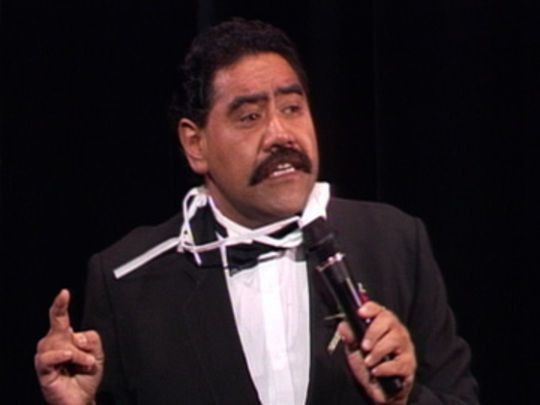
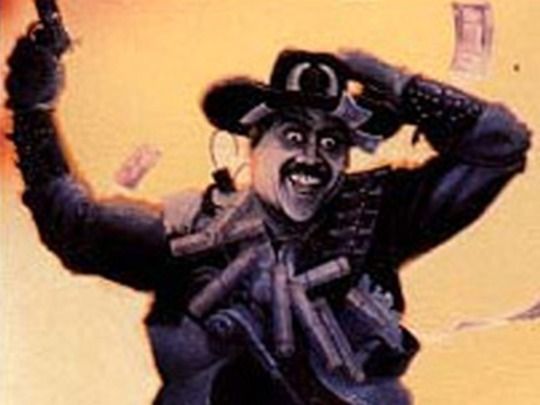
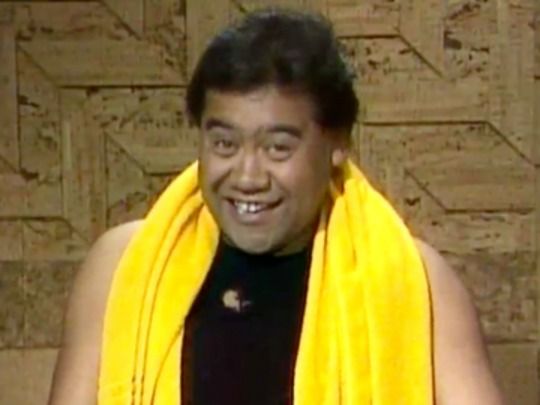
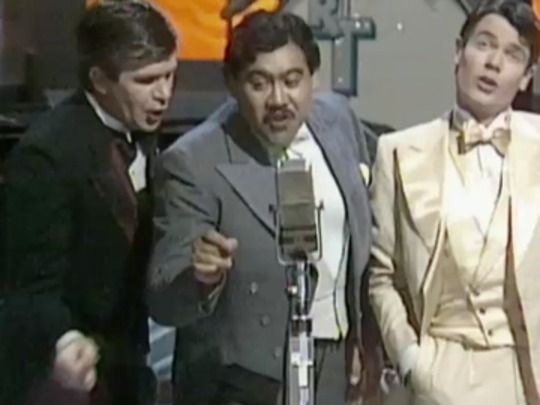
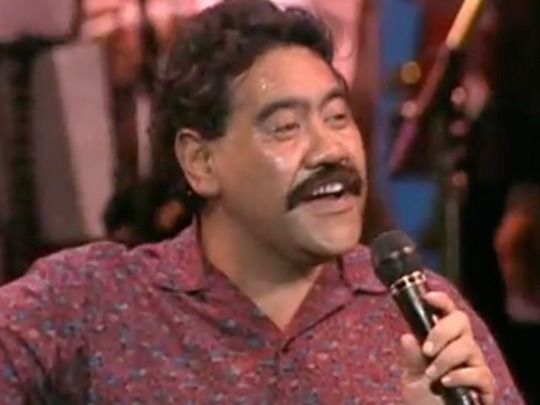
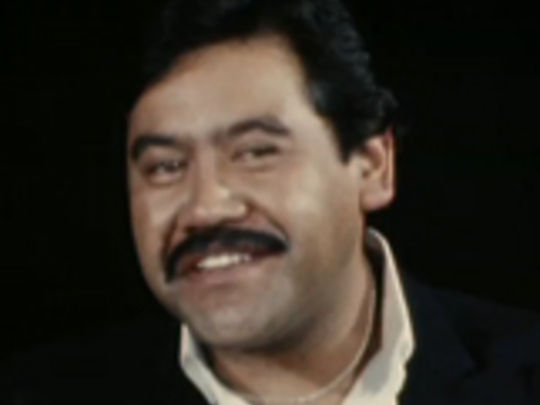
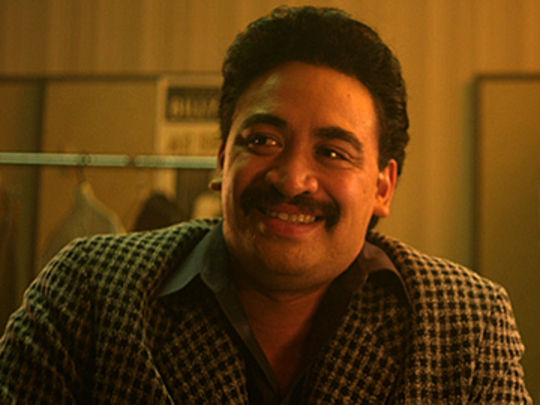
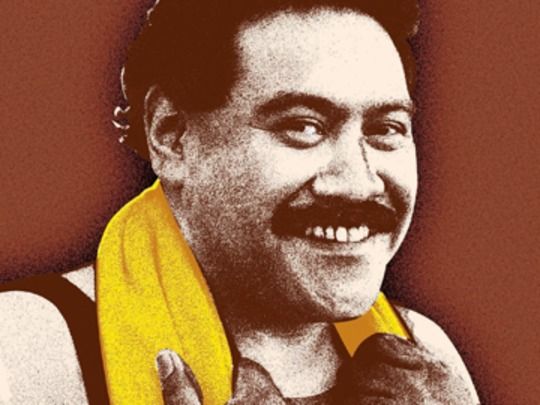
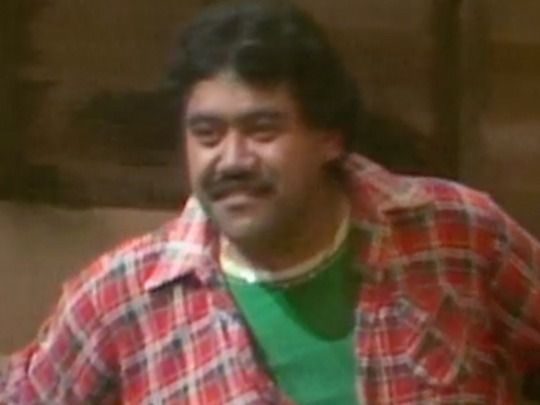
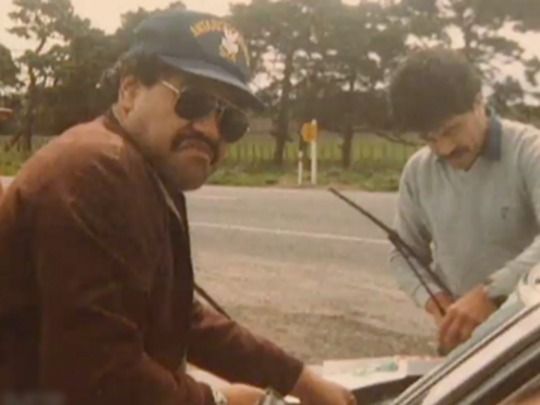
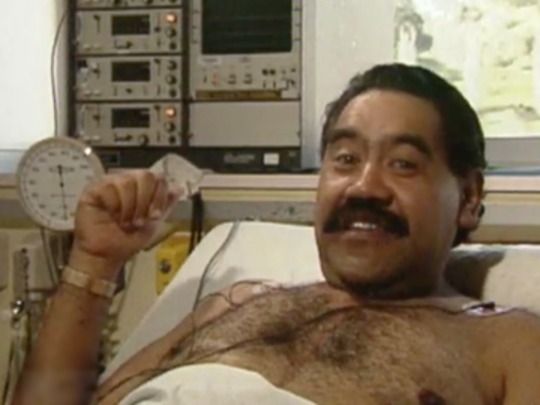
The Billy T James Collection
The Billy T James Collection
This collection has two backgrounds:
The Guiding Star
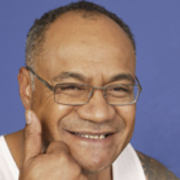
Billy T: A Tribute

The Guiding Star
By Oscar Kightley 03 Aug 2011
John Clarke demonstrated that Kiwis can be comedy geniuses. Billy T James proved it wasn’t a fluke. Countries hold their funny people dear to their hearts and perhaps no one is loved more than this man.
To me he was the guiding star that kept me alive and hopeful in New Zealand during the 1980s. I was 10 when he started on Radio Times; 11 when he was named Entertainer of the Decade; 15 when he did Came a Hot Friday; 18 by the time he finished his stupendous sketch show series; 19 when I was lucky enough to meet him the one time; 20 when he gave his last television performance for his Christmas special; and 21 when that new heart finally failed.
By then he had seen not just me, but the whole of New Zealand, through one of the most difficult decades in our young history.
It started with division and turmoil with the 1981 Springbok tour and included the time we gave baby Prince William a buzzy bee, a snap election, our nuclear-free stance, the sinking of the Rainbow Warrior, Rogernomics, a stock market crash and growing multiculturalism.
We weren’t little Britain anymore, but like Little Britain things can be quite hilarious here on these funny-shaped islands at the bottom of the South Pacific Ocean. Billy knew that and showed us. His style was subtle, a little cynical even: it worked on many more levels than some gave him credit for, and he was always a crack-up. Whatever he was doing, he was always entertaining, and the audience — and its experience — was the whole point.
If it’s true that New Zealand is a juvenile compared to other countries, then Billy T James held our hand through the growing pains of our teenage years and told us everything was going to be all right.
Things were about to change even more in the 90s. But by then, thanks to Billy T and his writers and fellow performers, we had laughed at ourselves enough to be able to cope whatever the world threw at us next. Stonewash denim was only a hint of the horrors to come.
I can still remember the nervousness that I felt as I waited in the lobby of a radio station building in 1988. I was a cadet reporter at The Auckland Star newspaper.
Billy T James was recovering from his heart transplant operation and was about to make his first public appearance since then. On a radio show. I was about to meet a man who had become my hero. I was still a fresh kid from the islands at the beginning of the 80s. Thanks to him, I ha'd made it to this age relaxed enough to be able to enjoy life. I still felt like a fresh kid from the islands, but I could start making jokes about it.
When I met him he was quiet. Studious. Calm. Polite, but didn’t give too much away. His many characters and performances were his work. The real Billy he kept away from the public. Fair enough too. Probably only his family and the people close to him saw that.
I just consider myself blessed to have been able to meet one of the artists who helped shape our consciousness in this country.
Many talented comedians have continued to burst through the doorway that Billy T James made wider. We are still blessed with people who crack us up. The likes of Jemaine Clement, Bret McKenzie and Taika Cohen keep the flame going and keep proving to us that our country can produce comedy greats.
Those of us who have seen him work will have our own favourite Billy T moments. If you weren’t around when he worked his magic, thanks to the marvels of the digital age you can discover him now. Enjoy.
He was an extraordinary spirit who gave an extraordinary amount of himself when he was on this Earth. New Zealand was blessed to benefit from it.
- Oscar Kightley is a celebrated comedian, actor, and writer. A founding member of comedy troupe The Naked Samoans, he has been a pioneering voice in New Zealand comedy. He co-created animated series bro'Town, and co-wrote and acted in two Sione’s Wedding films.
Billy T: A Tribute

By Matt Elliott 03 Aug 2011
Billy made the art of comedy, that difficult job of making people laugh, look so easy. Watching him perform, you’d think all you had to do was laugh and smile and trot out a few puns. If only it was that easy! Billy was the Swiss Army knife of comedy.
He had a great selection of tools to call on — superb timing, the ability to faultlessly tell a joke or play through a sketch, the mischievous eyes, the infectious smile, put-on giggle, and an ear for accents. He had a good voice, the ability to play many instruments, dance a little, draw and paint. The term multi-talented doesn’t seem to do someone like Billy justice.
It is remarkable that even two decades after his death, aged only 42, the mere mention of his name can bring a smile to faces, a wistful look to the eyes, the recitation of one of his best-loved lines, or the telling of stories about seeing him perform at a local venue or even just seeing him in the street. Billy made people feel good. He still does.
After a time in a variety of pub bands (and then the Māori Volcanics showband) and with the unwavering support of his wife Lynn, Billy became a household name thanks to his role as the very English emcee of Radio Times, Dexter Fitzgibbons. So convincing was he as the radio toff, some didn’t believe there was a shy Māori under the Brylcreem.
Even the usually dour critics wanted to see more of him, and so The Billy T James Show was developed. It incorporated all the elements of English cabaret — big bow ties, leggy dancers, a traditional sidekick in the form of Laurie Dee, and cheap gags. Audiences, both in the studio behind the cameras and on the couch in the lounge, couldn’t get enough of him.
Billy was what is known in comedy circles as a 'magpie'. He lifted a lot of jokes from other performers and made them his own. He took material he knew worked for other performers, such as The Two Ronnies, and put them in a Kiwi setting, with the cheeky Māori character getting the big laughs from harmless, funny puns and other gags.
This is best illustrated by his Te News/Marae Witness News segments. The sight of Billy in the black singlet with the yellow towel around his neck — head slightly bowed giving a hint of some of his natural shyness — still seems so fresh. Exciting, even.
That wasn’t to say that Billy couldn’t write his own material. When the crushed velvet bow tie was thrown in the back of the wardrobe and replaced by an open neck shirt, there was less reliance on joke books. Producer Tony Holden teamed Billy with Peter Rowley, and the trio brought to the small screen Billy’s most important sketches: Captain Cook arriving in New Zealand and meeting a Māori chief.
These short sketches, with great punchlines, didn’t seek to preach about race relations in New Zealand. Billy always said he was just a comedian. They 'just set out to achieve the most important comedy goal — to get a big laugh. They did, but they also allowed us to laugh at something we all know so well. Something very Kiwi. Not American, not British, not Australian. Something that was ours.
There is one role that is Billy — The Tainuia Kid in Ian Mune’s Came a Hot Friday. The Kid is just that — a kid — and that is Billy. The boy who played cowboys and Indians, and loved playing with pretend guns, was now the grown man getting paid to play cowboys and Indians and fire real guns. His part was only a small one, but he stole the show and became a key ingredient in the marketing of the film.
He could act seriously, too. In television drama The Protestors, which centered on a land occupation, Billy wasn’t out of place alongside a heavyweight cast: Jim Moriarty, Merata Mita, and Zac Wallace. For some, it is his best performance; a rarely seen gem.
On TV and in print, advertisers knew the appeal and value of having Billy plug a product, be it confectionary, barbeques or hardware. If you wanted to get a serious message across — about health, water or road safety — Billy was the one to do that, too. People took notice of Billy. They sat up, listened and laughed.
Tragically, Billy’s story wasn’t all laughs and smiles. He was a sensitive, shy soul. He just wanted to make people happy. Thus, accusations that some of his material was racist stung him. He was hurt and increasingly annoyed at having to answer to such claims. They were absurd, to say the least. It was like saying that Colin Meads only played rugby to stomp on people, or Sir Edmund Hilary only liked Sherpas when they were getting him to the top of mountains!
In his last years, poor health and ill-informed business decisions took their toll on him physically and mentally. However, his return to stages around the country after a heart-transplant remains his greatest triumph.
When Billy was born, the mould wasn’t only broken, it was smashed into a thousand pieces and those were scattered to the four winds. He was an extraordinary one-off. Even though his field of expertise is perceived as not serious, highly intellectual or academic, he should still be considered one of our great New Zealanders.
He made an enormous, positive contribution not only to entertainment but also to how we see ourselves. If his face was on a banknote, we’d all smile a little more each day. But then again, there wouldn’t be many notes in circulation— they’d be on display in homes around the country, on the front of fridges or pinned to walls!
If ever you’re driving past Mount Taupiri, south of Huntly, where Billy is buried next to his parents Ruby and Wiri, toot the horn and say "Where’d I get my bag? I pinched it". An unforgettable gag, from our unforgettable comedian.
- Matt Elliott is an author and former stand-up comedian. Elliot was one of the first Kiwi comedians to hone his craft on the Melbourne comedy circuit before he made the move into writing. In 2009 he published biography Billy T: The Life and Times of Billy T James.